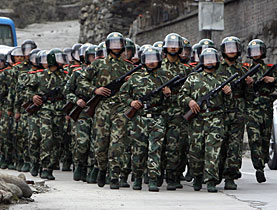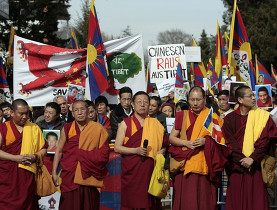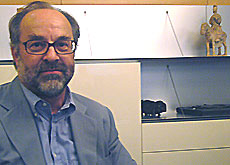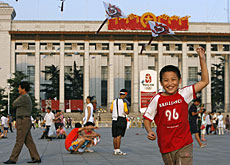Tibet in “desperate situation”, warns envoy

The situation in the city of Lhasa is extremely grave with the population living under de facto martial law, said the Dalai Lama's Geneva-based European envoy.
More than 80 people have been killed and several hundred injured, and protests are spreading to other parts of Tibet, Kelsang Gyaltsen told swissinfo.
“Even though the Chinese government doesn’t dare to officially announce it, the situation in Lhasa is de facto martial law,” he said.
Schools and monasteries are sealed off, and there are heavy restrictions on people’s movements with security forces stepping up their hunt for rioters in house-to-house searches, he explained.
Around 400-500 people who received gunshot wounds are without medical assistance, scared of being arrested if they go to hospital, Gyaltsen added.
On Monday a senior Chinese official denied that troops had used lethal force to quell protests in Lhasa, claiming that they had shown huge restraint in the face of violent protests by Tibetans, which it said were orchestrated to wreck Beijing’s Olympic Games in August.
Qiangba Puncog, the government chief in Tibet, said that only 13 “innocent civilians” were killed and dozens of security personnel were injured in Lhasa when several days of monk-led protests broadened into riots in which houses and shops were burned and looted last Friday.
Fears
There were reports of troops pouring into neighbouring provinces to quell copycat protests and riots which had broken out in Tibetan communities in the provinces of Sichuan, Qinghai and Gansu over the weekend.
China has given Tibetans involved in the protests a deadline of midnight on Monday (16.00hrs GMT) to surrender to police or face tougher punishment.
Gyaltsen said he was fearful of a crackdown by the Chinese government.
“We are deeply worried as the Chinese are expelling non-governmental organisations and foreigners in Tibet. The Chinese government seems to want to seal Tibet from the outside world,” he said.
Speaking from his home in India’s Himalayan foothills on Sunday, the Dalai Lama called for an investigation into what he called cultural genocide in Tibet.
Protests
There have been daily pro-Tibet protests around the world since last Monday, the 49th anniversary of an uprising against Chinese rule.
Up to 2,000 people demonstrated outside the Chinese consulate in Zurich on Saturday. Police used tear gas against some participants.
Protests have also been held in other countries, such as India, Nepal, France, Britain, the United States and Australia.
The Swiss foreign ministry condemned “acts of violence” against demonstrators in Tibet. Similar appeals for restraint have been made by other western governments, including the US, Britain, France, Germany and Australia.
The head of the parliamentary group for Tibet, Mario Fehr, said that the International Olympic Committee (IOC) should ensure that human rights were respected in China, ahead of the Beijing Olympics this summer.
The president of the IOC, Jacques Rogge, said that no boycott of the summer games in Beijing was envisaged.
But the Swiss Olympic Committee wants the IOC to intervene with China over the troubles in Tibet.
“The Rubicon has been crossed,” said its president, Jörg Schild. “I can’t bring myself to say that we’re going to go there and do sport.”
swissinfo with agencies
Switzerland is aiming to step up bilateral ties with China. The two countries have a long history of collaboration economically and politically.
Tibet, however, remains a difficult issue. Chinese President Jiang Zemin on a state visit to Bern in 1999 gave former interior minister Ruth Dreifuss a dressing down following a pro-Tibetan rally outside parliament.
China also expressed its displeasure when the spiritual leader of Tibet, the Dalai Lama, visited Switzerland in 2005. China does not recognise Tibet’s claim for independence.
Switzerland is home to 3,500 Tibetans, according to 2005 figures. They are said to form the biggest Tibetan community in Europe, and the third largest in the world.

In compliance with the JTI standards
More: SWI swissinfo.ch certified by the Journalism Trust Initiative



You can find an overview of ongoing debates with our journalists here. Please join us!
If you want to start a conversation about a topic raised in this article or want to report factual errors, email us at english@swissinfo.ch.